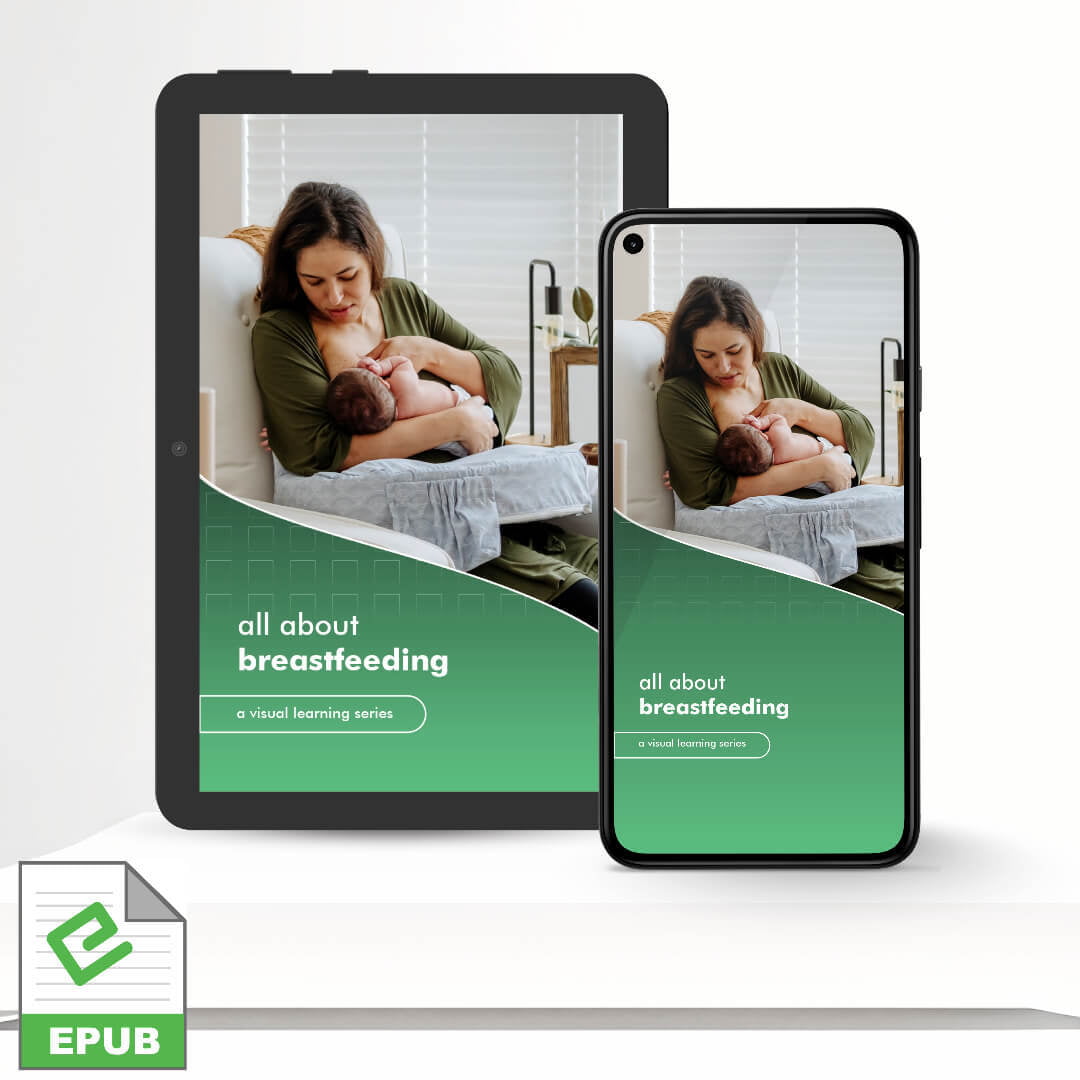Navigating breastfeeding can feel like an emotional rollercoaster for new parents, filled with moments of joy, bonding, and sometimes, challenges. Decisions you make during difficult moments can impact your breastfeeding story. Rest assured—with proper guidance, you can succeed and overcome challenges. Ensuring a healthy development path for your baby while taking care of your own well-being are two of the most essential priorities in the early weeks.

Are you ready to master the art of breastfeeding? I've got an exciting offer that you will want to grab. I'll reveal a limited-time offer on our most popular breastfeeding eBook in a few moments. But first, let me share a bit more about overcoming breastfeeding challenges before they happen!
Meet Laura, an expectant mother who is soaking up every bit of information she can. Awaiting her baby's arrival, she's been like a sponge, reading books and researching the best for her little one, who is due any day now. Committed to giving her baby the best start, Laura has decided to exclusively breastfeed. She has invested in the latest breastfeeding gadgets and equipment to make this process smoother. Amidst this all, she paints a beautiful mental image of the countless moments she will share breastfeeding and bonding with her baby.
However, reality turned out to be far more challenging. After bringing baby home from the hospital, Laura faced issues with a low milk supply. As panic set in, she questioned her abilities as a mother. She felt overwhelmed and wondered what had gone wrong—after all—she had everything planned out so well!
Laura reached out for help from a lactation consultant. With their support and expertise, she learned that low milk supply can sometimes be caused by various factors. Some are within a person's control, like feeding frequency, to help build a good milk supply. However, some factors, such as hormonal imbalances, are beyond a person's control. In the end, Laura's story has a positive outcome thanks to a supportive partner and family encouraging her to seek help. She acted quickly, and a lactation consultant was able to work closely with her and implement changes to increase her milk supply.Some are within a person's control, like feeding frequency, to help build a good milk supply. However, some factors, such as hormonal imbalances, are beyond a person's control. In the end, Laura's story has a positive outcome thanks to a supportive partner and family encouraging her to seek help. She acted quickly, and a lactation consultant was able to work closely with her and implement changes to increase her milk supply.
Remember, each story is different, and we hope to help you confidently embrace yours. Here are some common challenges breastfeeding parents experience at some point during their journey.
Milk Supply: Oversupply and Low Supply
Milk Supply: Oversupply and Low Supply
An imbalance in milk supply, whether can significantly impact the breastfeeding experience. Oversupply can lead to issues such as mastitis, clogged ducts, and discomfort for both the mother and baby. On the other hand, low supply can stress mothers over their baby's nutritional intake. Key to managing these challenges is seeking lactation help to ensure the baby is getting enough milk and thriving. Both of these issues can have positive outcomes for you and your baby. However, knowing the signs and getting help immediately if you suspect a problem is crucial.
Sore Nipples
Sore Nipples
Breastfeeding is a new skill for baby, and maybe for you, too. So, you can expect an adjustment period. Nipple pain peaks around the first few days and should gradually lessen. Soreness is common but should not be a persistent issue. Practical strategies to alleviate soreness include:
- Using different breastfeeding positions.
- Ensuring proper latch. A good rule of thumb is—if it hurts, remove the baby from the breast, and try latching again.
- Applying nipple creams or expressed milk to the affected area and letting them air-dry for a few minutes after feeding.
Learn the warning signs: persistent pain, cracking, or bleeding should prompt seeking medical advice to prevent infections.
Engorgement
Engorgement
Breast engorgement is characterized by swollen, tender breasts filled with milk. It occurs during the early days of breastfeeding as the milk comes in. Management of this early fullness is, you guessed it, frequent breastfeeding. It's important to remember unresolved engorgement can damage your milk supply and put you at a greater risk for infection. Some preventive measures include:
frequent breastfeeding
proper latching
use a variety of breastfeeding positions
avoiding sudden weaning
Plugged (or blocked) Ducts
Plugged (or blocked) Ducts
A plugged duct can occur when a milk duct in the breast becomes blocked, preventing milk flow. How does one become blocked? It can be caused by a host of things like engorgement, skipped feedings or expression, improper latch, poorly fitting bras, stress, fatigue, or prior breast surgery. Symptoms of plugged ducts may include:
a firm lump or tender spot in the breast
redness or warmth in the affected area
pain or discomfort while breastfeeding or touching the breast
Keeping to a regular feeding schedule, making sure milk is removed effectively, and applying gentle pressure or massage to the area while feeding can help. A plugged duct can lead to more severe complications, like mastitis if left untreated. If you notice signs of, be sure to seek medical help right away.
Mastitis
Mastitis
A primary cause of mastitis is often a milk duct becoming blocked and not properly draining. Bacteria can grow in the trapped milk, leading to infection.Mastitis is a breast tissue infection causing intense swelling, redness, and pain, commonly seen in breastfeeding women. However, it can occur in non-breastfeeding women and men too. It can also cause fever, chills, and flu-like symptoms. While mild cases of mastitis may resolve on their own, more severe cases may require medical intervention to prevent complications and ensure a speedy recovery.
If you suspect you have mastitis, it's best to consult with a healthcare professional. They may prescribe antibiotics to help clear the infection. Meanwhile use these tips:
gentle massage while feeding
cold compresses after feeding to reduce swelling
continue to breastfeed or pump to help clear the blockage and ease the symptoms
Thankfully, even when severe, mastitis doesn't impact the quality of your milk and is not contagious. That means you can and should continue breastfeeding your baby and/or storing the breast milk if you are pumping.
Breastfeeding When You Are Sick
Breastfeeding When You Are Sick
Becoming sick or feeling ill is bound to happen at some time during your breastfeeding journey. Did you know that by the time you show any symptoms, your baby has already been exposed? So, there's no need to worry about how you'll continue to feed your baby. Breastfeeding is generally safe and can continue with precautions, such as wearing a mask if respiratory symptoms are present. The antibodies produced during illness can protect the baby. Remember to wash your hands, stay hydrated, eat well, and feed your baby or express milk on the same schedule as usual. These tips are critical to avoid affecting the milk supply.
Breast Milk and Medications
Breast Milk and Medications
Care must be taken when consuming medications during breastfeeding, as substances can pass into breast milk. Over-the-counter medications should be short-acting and timed around breastfeeding sessions. Always speak with your healthcare provider about medication safety and remind them you are breastfeeding. They can discuss any alternative medications or treatments with less risk to your baby while you are breastfeeding. Remember, vitamins and herbs should be treated with the same caution: let your doctor confirm they're safe for you and won't affect the baby.
Influence of Drugs and Alcohol on Breastfeeding
Influence of Drugs and Alcohol on Breastfeeding
To ensure a baby's healthy development, avoid smoking, drinking alcohol, and using drugs while breastfeeding. All of these substances can diminish a parent's ability to care for their child. If you are struggling with an addiction, please seek professional help! Drinking alcohol can affect an infant's growth and sleep patterns. Smoking, even secondhand smoke, increases health risks for both you and baby. The use of marijuana or other illicit drugs can impair development and lead to withdrawal symptoms in infants.
Certified Lactation Consultants: Do I really Need One?
Certified Lactation Consultants: Do I really Need One?
Certified Lactation Consultants are trained and accredited professionals specializing in breastfeeding support. It's worth noting that there are various types, each having different training and experience levels:
- International Board Certified Lactation Consultants (IBCLC)
- Certified Lactation Consultants (CLC)
- Certified Lactation Specialists (CLS)
- Certified Lactation Educators (CLE)
- Peer Educators
Lactation consultants work in hospitals, collaborating with nursing staff to provide in-hospital breastfeeding support. Many also work in pediatric offices and clinics, and some operate private practices. These professionals are specifically trained in breastfeeding, its potential complications, and overall nursing health.
Getting help from a lactation consultant can be great for many reasons. They can assist you in latching your baby correctly, ensuring baby is getting enough milk, and helping you overcome breastfeeding challenges. Given their extensive training, Certified Lactation Consultants can offer evidence-based guidance and emotional support during what can be a stressful time. They aim to make every family feel safe, supported, and confident about feeding their child.

Coupon Code: SAVE30-BFSolutions
Whether you're preparing for or currently on your breastfeeding journey, ensure success with our comprehensive eBook, All About Breastfeeding! Discover expert guidance, tips, and solutions tailored to your needs. Plus, for a limited time, enjoy 30% off your purchase of this eBook! Equip yourself with the knowledge and support you need – invest in your breastfeeding journey today!
Final Thoughts
Final Thoughts
To sum it up, we hope this article on breastfeeding challenges has provided you with helpful information about how to best care for your breast during breastfeeding. Even though it's a natural process, breastfeeding may sometimes come with difficulties that require immediate attention and support. Not all problems can be avoided. However, being aware of potential issues and responding promptly is crucial. Guidance from a lactation consultant or healthcare professional can transform breastfeeding into a rewarding experience for you and your baby, despite any challenges you might face.
Remember, you matter, too. Don't be too hard on yourself—never stop learning and exploring new ideas. Embarking on any journey that helps us become a better version of ourselves is always worthwhile.
#BreastfeedingTips #BreastfeedingProblems #BreastfeedingPainRelief #BlockedMilkDucts #NippleSoreness
#AllAboutBreastfeeding #LifeEventsInc




